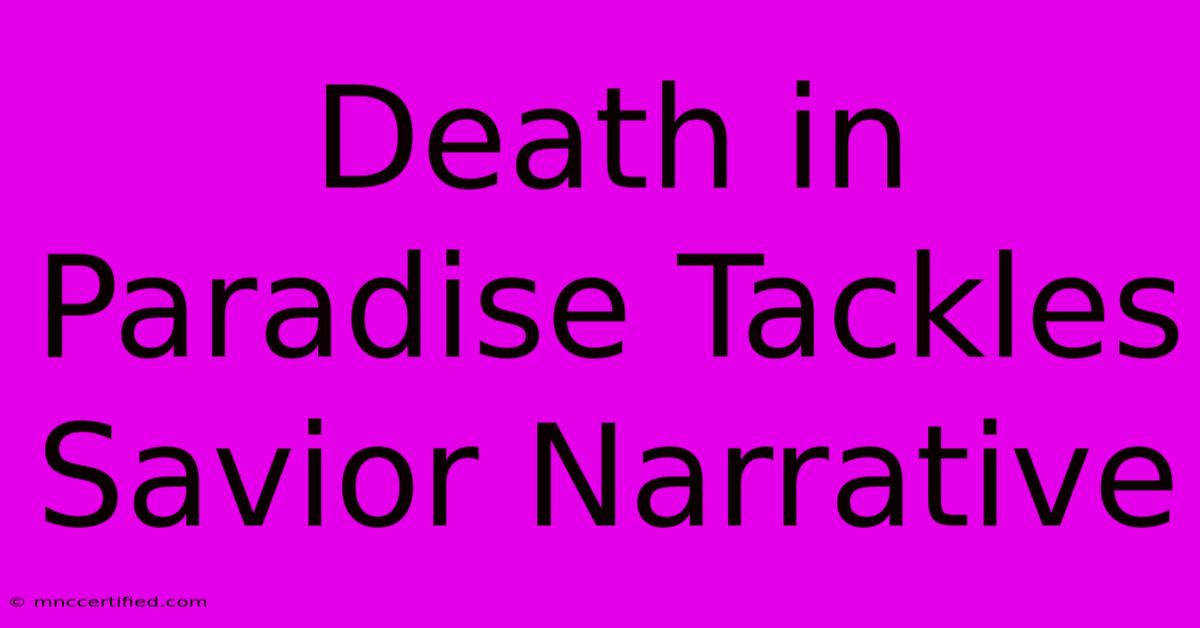Death In Paradise Tackles Savior Narrative

Table of Contents
Death in Paradise Tackles the Savior Narrative: A Deeper Dive into Season 12
Death in Paradise, the beloved BBC crime drama set in the idyllic Caribbean island of Saint Marie, has consistently charmed audiences with its captivating mysteries and charming cast. However, Season 12 subtly shifted gears, venturing beyond the typical whodunit formula to explore complex themes, including the problematic nature of the "savior narrative." This article delves into how the season cleverly dismantles and critiques this trope, offering a nuanced portrayal of intervention and its consequences.
The Savior Narrative: A Familiar Trope Deconstructed
The "savior narrative" is a common storytelling device where a character, often an outsider, arrives to rescue a community or individual from a perceived state of backwardness or crisis. While seemingly positive, this narrative can be problematic, often perpetuating harmful stereotypes and neglecting the agency of the people being "saved." Death in Paradise, usually a show focused on the charming escapism of solving crimes, subverts this trope in Season 12 by presenting a more complex and critical view.
Challenging Assumptions: The Inspector Neville Parker Effect
The introduction of Neville Parker (Ralf Little) as the lead detective significantly impacts the show's portrayal of the savior narrative. Initially, his analytical approach and meticulous nature, contrasting sharply with the more laid-back style of his predecessors, seem to align with the savior archetype. He brings a level of investigative skill previously unseen in Saint Marie. However, the season carefully avoids portraying him as a singular force for good, instead highlighting his vulnerabilities and the limitations of his outsider perspective.
Local Perspectives: Giving Voice to Saint Marie
Season 12 excels at centering the voices and perspectives of the Saint Marie community. Rather than simply being the backdrop for Parker's investigations, the local characters are given agency and depth. Their experiences and insights challenge the idea of Saint Marie needing external salvation. This shift emphasizes collaborative problem-solving, showcasing the strengths and resilience of the island's residents. The show acknowledges that “saving” someone often implies a power imbalance that needs critical examination.
Beyond the Tourist Gaze: A More Authentic Portrayal
The show’s depiction of Saint Marie itself also plays a significant role in subverting the savior narrative. Past seasons, while charming, occasionally fell into the trap of presenting a romanticized, almost stereotypical view of island life. Season 12 strives for a more nuanced and authentic portrayal, acknowledging both the beauty and the complexities of the island's culture and society. This move creates a more realistic and engaging narrative, fostering a stronger connection between the audience and the characters.
The Importance of Collaboration, Not Conquest
The most significant departure from the traditional savior narrative is the emphasis on collaboration rather than conquest. Parker, despite his initial outsider status, gradually learns to work with the local community, recognizing their invaluable contributions to solving crimes. This collaborative approach subtly challenges the hierarchical power dynamic often inherent in savior narratives, where the outsider holds all the power and knowledge.
Conclusion: A Deeper, More Meaningful Death in Paradise
Season 12 of Death in Paradise marks a significant evolution for the series. By consciously challenging the savior narrative, the show offers a more nuanced, complex, and ultimately, more meaningful viewing experience. It's a testament to the show's ability to evolve while maintaining its lighthearted charm, showcasing its growth and maturity as a program. The show’s willingness to tackle such significant themes not only deepens its storytelling but also enhances its overall appeal, drawing in viewers who appreciate its sophisticated approach to both crime-solving and social commentary. This shift strengthens its position within the crime drama genre and suggests exciting developments for future seasons.

Thank you for visiting our website wich cover about Death In Paradise Tackles Savior Narrative. We hope the information provided has been useful to you. Feel free to contact us if you have any questions or need further assistance. See you next time and dont miss to bookmark.
Featured Posts
-
Eagles Vs Commanders 12 22 24 Live Score And News
Dec 23, 2024
-
Gloomy Tommy Fury Usyk Vs Fury
Dec 23, 2024
-
Falcons Win Penix Jr S Strong Start
Dec 23, 2024
-
Jalen Hurts Concussion Eagles Qb Injury Update
Dec 23, 2024
-
Leicester 0 3 Wolves Live Match Reaction
Dec 23, 2024